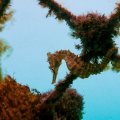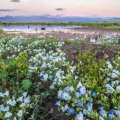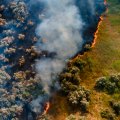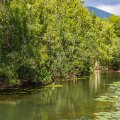Manta rays are hard to miss - big and black, stretching up to seven metres wide, but scientists are concerned about the survival of the world's largest ray.
The University of Queensland's Project Manta is joining forces with Western Australia's Murdoch University scientists and industry partners Austral Fisheries and the TG Kailis Marine Conservation Fund to establish "Project Manta - WA".
Project Manta's Dr Kathy Townsend said there was a sense of urgency to increase understanding of these completely harmless ocean giants.
"Manta rays can be considered the canaries in the coal mine in relation to the marine environment in which they live," Dr Townsend said.
"Manta rays have recently been listed as vulnerable to extinction on the International Union for Conservation of Nature (IUCN) Red List of Endangered Species because of the unsustainable, unregulated fisheries in Indonesia, Sri Lanka, Mexico and Africa.
Mr Frazer McGregor, from Murdoch University said "Manta rays are a big ecotourism drawcard, forming the basis of multimillion dollar tourism industries."
"A recent proposal to have manta rays listed as a threatened species under the Environmental Protection and Biodiversity Conservation Act 1999 (EPBC Act) was unsuccessful and highlights that there are significant knowledge gaps about the species."
Project Manta has established a comprehensive network of recreational divers and dive industries that provide identification photographs of manta rays along the entire east coast of Australia.
Murdoch University's study has been focused at Ningaloo Reef off Western Australia.
Both research groups independently collated a database of more than 650 individual animals within their respective research areas.
"The support of Austral Fisheries and the TG Kailis Marine Conservation Fund will allow the two largest manta ray research projects in Australia to join forces, enabling one of the most comprehensive studies of the biology and ecology of manta rays in the world," said Mr David Carter, CEO of Austral Fisheries.
"This project aims to gather the data required to ensure manta rays receive full protection status in Australian waters."
The national project is calling on local divers and snorkellers from around Australia to become actively involved in creating an image database to identify manta rays.
The aim is to recruit new citizen scientists across the manta ray's entire range, from Western Australia, the Northern Territory, Queensland and New South Wales.
"We specifically want pictures of the underbelly of the manta ray because they can be used to identify individuals," Dr Townsend said.
"The black and white patterns are as unique as a fingerprint."
The nationwide collaboration between scientists, industry and the general public started in July 2013.
People are encouraged to upload their photos of manta rays to 'Project Manta' community page on Facebook or by email them to project.manta@uq.edu.au.
The Western Australian Project is sponsored by industry partners Austral Fisheries Pty Ltd and the Kailis Family's TG Holdings Pty Ltd, TG Kailis Marine Conservation Fund.
Media: UQ School of Biological Sciences Communications Manager Tracey Franchi, 07 3365 4831 or t.franchi@uq.ed.au; Dr Kathy Townsend, 0428 388 959 or kathy.townsend@uq.edu.au.
PHOTOS: Photo of manta rays and diver(s) taking identification photographs available on request to t.franchi@uq.edu.au
About the School of Biological Sciences
Through research undertaken in the School, UQ has been ranked by the 2012 National Taiwan University Rankings in the top five universities globally for research in ecology and environmental biology and in the top 18 universities globally for plant and animal biology.
The UQ School of Biological Sciences attracts researchers of world standing in a range of disciplines, with international leaders in many diverse fields.
Our work spans the scales of biological organisation, from molecules and cells to organisms, populations, species and communities.
With more than 150 researchers working in evolution, global change biology, ecology, aquaculture, animal behaviour, physiology, entomology, zoology, botany, genomics, development and conservation biology, our researchers and graduate scientists are well-equipped to make a real difference in contributing to solving global problems.
.jpg)









